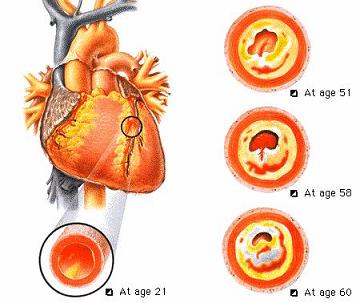In adults, a cholesterol level of less than 200 milligrams per 1 deciliter (3 ounces) of blood is considered desirable. Above that level, the risk of heart disease increases dramatically. Adults also are at an above-average risk of heart disease if they have an LDL-cholesterol level of more than 160 milligrams per deciliter of blood or an HDL-cholesterol level of less than 40 milligrams per deciliter.
Besides cholesterol levels, other factors increase the risk of heart disease. These factors include cigarette smoking, high blood pressure, diabetes, a family history of premature heart disease, and being a male over 44 years of age or a female over 54. Individuals with two or more of these factors have high risk of heart attack, particularly if they also have atherosclerosis (narrowing of the arteries because of fatty deposits).
|


